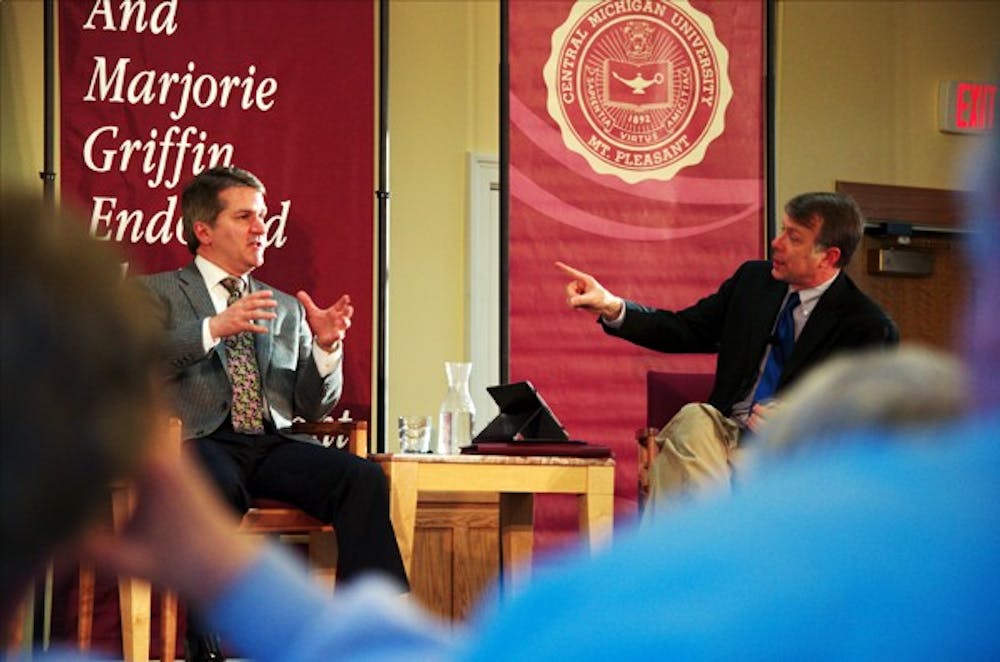Politicos talk Republican primary, predict winner in fall elections at Griffin Policy Forum
Political insiders from across the state traveled to Central Michigan University Monday evening to discuss current issues in Michigan politics and make predictions about the 2012 elections at the spring Griffin Policy Forum.
The panelists included Jill Alper, Democratic strategist and media consultant at Dewey Square Group; Rusty Hills, director of public affairs for the Michigan attorney general; John Truscott, president and principal of Truscott Rossman; and Rick Wiener, founder of Wiener Associates. Rick Pluta, managing editor and state capitol bureau chief from Michigan Public Radio Network, moderated the discussion.
About 50 students and community members attended the forum, including state Sen. Judy Emmons, R-Sheridan, and state Rep. Mark Meadows, D-East Lansing.
When asked about which candidate would take Michigan in the presidential election, the panelists split down party lines. Alper and Wiener, both Democrats, said Obama would win, while the Republicans, Hill and Truscott, picked Romney, who they assumed would win the Republican nomination.
While the Republican primaries have not ended and former Sen. Rick Santorum and former Speaker of the House Newt Gingrich are still in the race for the nomination, Hills said Super PACs have been keeping them in the race longer than the candidates would have lasted on their own.
These organizations, which have funded much of the negative advertising surrounding the primaries, are not officially associated with a specific candidate.
“We don’t know yet how big (the impact will be),” Trustcott said. “It will be very, very significant.”
Finally, the discussion turned to the general atmosphere of politics today.
Several of the panelists related stories about politicians in the past would spar on the issues in public but later get together for drinks and a game of cards at the end of the day.
“It’s been shifting for probably 30 years now,” said Wiener, referring to the increase in bitterness between the political parties.
He attributed the change to the advent of the modern media, the rise in “talking heads” talk radio programming, the availability of instant feedback via the Internet and even an increase in freeways, which allow politicians to return home more often instead of staying in town and getting to know their colleagues in the legislature better.
“In politics, you come to expect certain attacks and can deal with them when they come,” Truscott said. “It’s when it rolls over to your family, your spouse, your kids, that it crosses a (barrier).
Helen Thomas, a retired teacher and member of the League of Women Voters from Mount Pleasant, said she had expected the discussion to be more heated than it was.
“I thought at the beginning it was going to be very sharp, but that was not the case,” Thomas said.
She attended the discussion with her friend Ginger Kjolhede, also of Mount Pleasant.
“I enjoyed (the discussion) very much,” Kjolhede said. “I loved the camradery they showed.”
CMU sophomores Brandon Suchecki, of Grand Haven, and Tyler Van Well, of Redford, attended the forum as part of a requirement for a history class.
Van Well said he enjoyed hearing about what goes on behind the scenes in elections and seeing how both parties attack different issues.
“I liked the end segment,” Suchecki said. “(The parties) are portrayed as bitter rivals, but they really do get along.”
“It humanized it,” Van Well added. “It’s not what we see on TV.”




